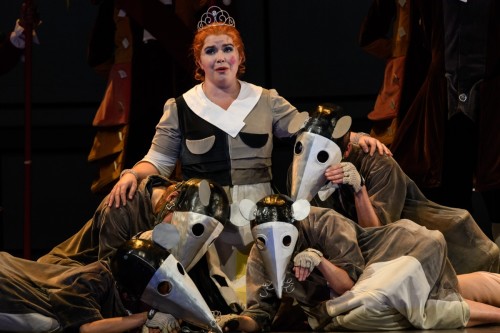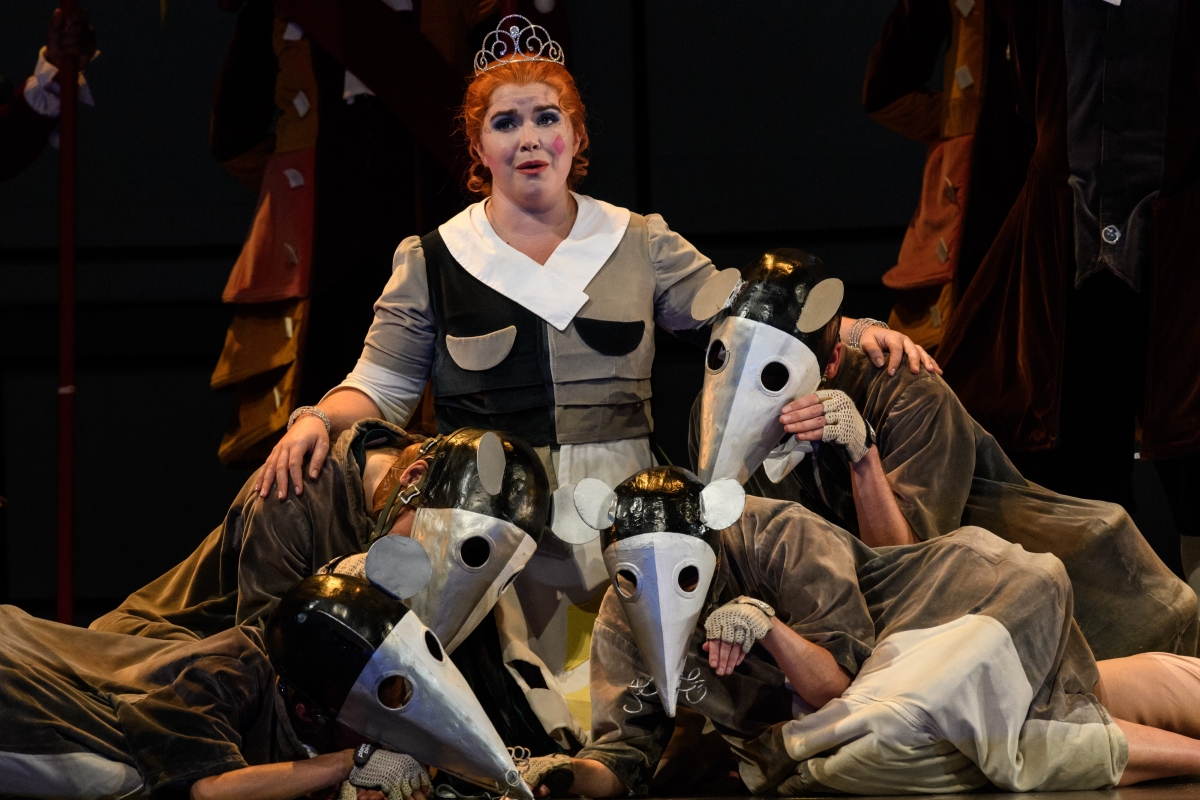 United Kingdom Rossini. La Cenerentola: Soloists, Chorus and Orchestra of Welsh National Opera / Tomáš Hanus (conductor). Theatre Cymru, Llandudno, 19.10.2018. (RJF)
United Kingdom Rossini. La Cenerentola: Soloists, Chorus and Orchestra of Welsh National Opera / Tomáš Hanus (conductor). Theatre Cymru, Llandudno, 19.10.2018. (RJF)

Cast included:
Angelina – Tara Erraught
Clorinda – Aoife Miskelly
Tisbe – Heather Lowe
Don Magnifico – Fabio Capitanucci
Alidoro – Wojtek Gierlach
Don Ramiro – Matteo Macchioni
Dandini – Giorgio Cauduro
Production:
Director – Joan Font
Revival Director and Choreographer – Xevi Dorca
Designer – Joan Guillén
Lighting Designer – Albert Faura
La Cenerentola was Rossini’s twentieth opera. It is now widely held to be second only to his seventeenth, Il barbiere di Siviglia his most performed and popular opera. Both works were composed during the period that the composer was Musical Director of the Royal Theatres of Naples. His appointment to Naples, to which he was summoned, and offered the post by the formidable impresario Barbaja, came when he was only twenty-two years of age. The Naples theatre, unlike others in Italy, had a professional orchestra and the possibilities of writing for such an ensemble greatly appealed to Rossini. It furthered his opportunity to write in a more complex and serious vein than had previously been open to him with the amateur musicians employed elsewhere. What also appealed was a contract that allowed him to accept work in other theatres in Italy. It was an opportunity he used to the full. During his tenure in Naples he composed nine opera seria for the theatre starting with Elisabetta Regina d’Inghilterra premiered on 4th October 1815 and concluding with Zelmira on 16th February 1822. They were his fifteenth and thirty second operatic compositions! His regular absences exceeded what the theatre and impresario might have envisaged, but they also allowed for the creation of several of his most notable and popular works mentioned above, Il barbiere di Siviglia, premiered at the theatre Argentina, Rome, on 20th February 1816 and La Cenerentola at Teatro Valle in the same city on 25th January 1817.
Jacopo Ferretti libretto of La Cenerentola by is not based directly on Charles Perrault’s fairy tale of 1697 but was plagiarised from Pavesi’s Agatina o la virtu premiata, which had its premier at La Scala in 1814. Originally Rossini was supposed to have set an entirely different work to open the Carnival Season on December 26th, 1816. However, on his arrival in Rome in mid-December he found the Papal Censors had rejected the proposed libretto provided by Ferretti. At a late-night crisis meeting with the impresario and librettist the subject of Cinderella was agreed, as was a postponed premiere. With less than a month to go before the new first night both composer and librettist had to make compromises. Rossini borrowed the overture from his own farsa La gazzetta, written for Naples a mere five months earlier (Review). He also employed a local musician, Luca Angolini, to assist him by composing all the secco recitatives as well as other pieces that are now generally omitted in performance and recordings, most of which follow Alberto Zedda’s Critical Edition used by Welsh National Opera.
This delightful staging was first seen by WNO audiences in 2007, the production being shared between Welsh National Opera, Houston Grand Opera, Gran Teatre del Liceu and Grand Théâtre de Genève. Joan Font directs with a carnivalesque approach, which together with magical scenic transformations brings the work nearer to pantomime than is often the case with productions in Europe and America. A major difference with the 2007 performances is in a number of Latinate voices among the male soloists, albeit the first heard is the sonorous Alidoro of Wojtek Gierlach, who acts the role, in its various manifestations of kindness and ruthlessness, with real stage presence along with his vocal strength and sonority. Particularly enjoyable also was Fabio Capitanucci as the somewhat errant stepfather, his quick patter singing and acting created a most meaningful character that allowed belief in his changes of behavior towards Angelina. Giorgio Cauduro as Dandini managed to be pretend boss, and later servant, to enjoyable acted appreciation and lithe well characterised acting and singing. As Don Ramiro, the Prince seeking a bride, Matteo Macchioni’s tenor did not erase memories of Colin Lee in the role in 2007, the former lacking some vocal heft. However, I wouldn’t mind hearing him sing the likes of likes of ‘Una furtiva lagrima’ where his softer tone and Italianate manner with phrases that would allow him to caress the notes without stress.
The ladies of the story have many challenges as actors and singers. Dolled up like a couple of strident madams Aoife Miskelly as Clorinda and Heather Lowe as Tisbe were excellent in all respects playing off each other as to the manner born. As the put upon Angelina Tara Erraught – otherwise ‘Cenerentola’ – married excellent acting along with an expressive voice of great depth and richness, that perhaps harkens to a future in Verdi. As it was her portrayal was wholly enjoyable. It was not her doing, but a producer concept, to have her back on stage, in skivvy costume, for a concluding lament that is not in Rossini’s score. Particularly notable was her acting along with the ubiquitous mice, who acted as scene shifters and sympathetic supports to Angelina when parental and sibling abuse was rampant.
Also, welcome in making this a first-class performance were the conductor and the male chorus. On the rostrum Tomáš Hanus drew excellent playing and vigorous tempi from the orchestra as befits the story from time to time and contrasted it nicely in the gentler moments. An altogether enjoyable evening and happy ending and they don’t come too often in Italian opera
Robert J Farr
